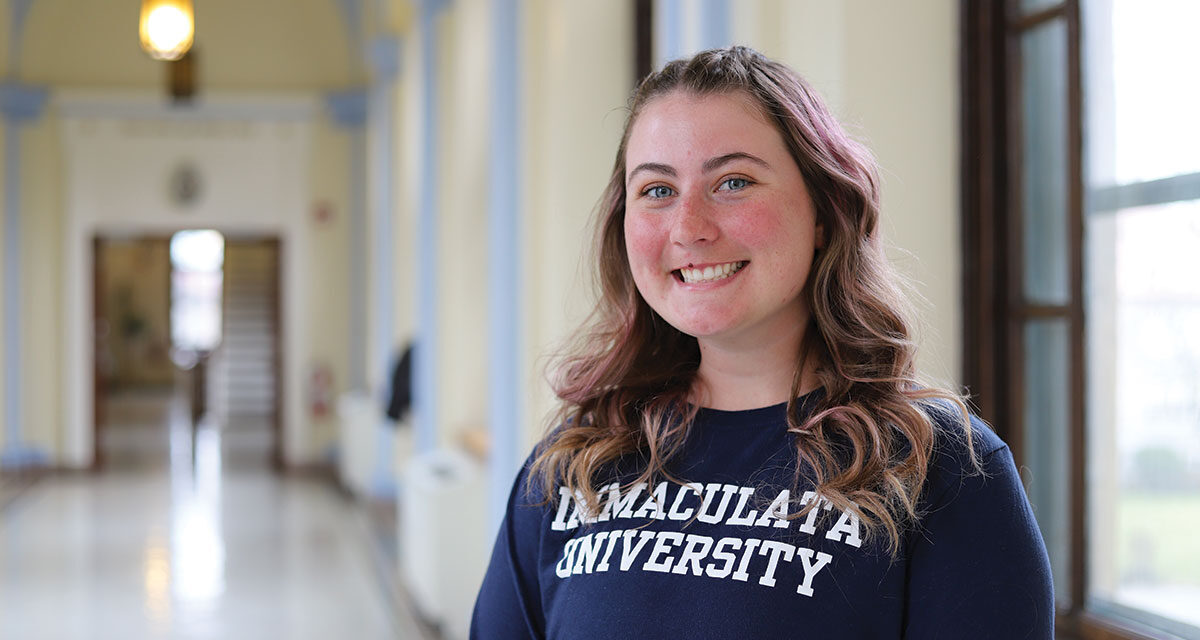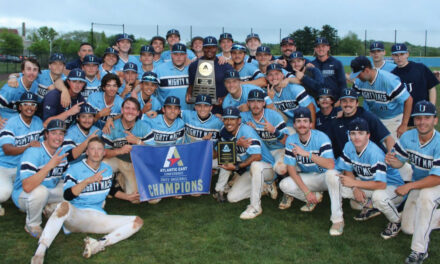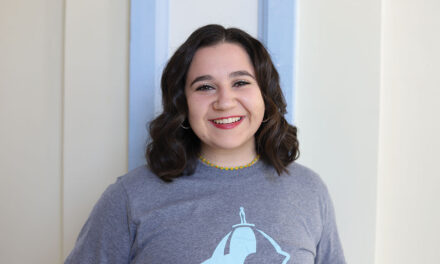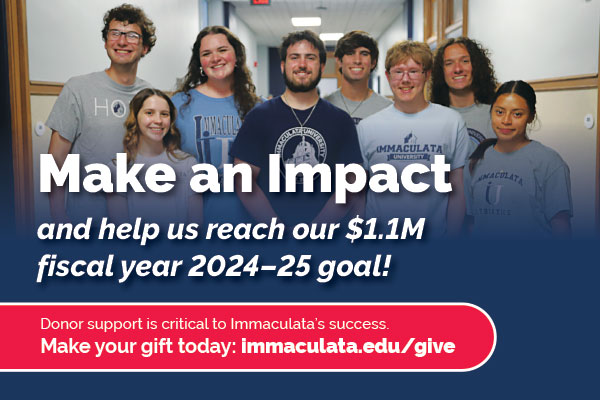Even before middle school, Catherine Knoll ’22 was being told that she had a special talent for softball. During high school, her coaches encouraged her to apply only to Division I universities. She remembers talking to representatives from Division I programs during middle school—before she even had time to explore career options.
“I told them, ‘Oh, I really want to go there.’ But it was all softball-driven,” she admits. She explains that once a student-athlete selects a college and starts to “live out their dream” of playing, he or she still has to be a student and perform well academically, which can be a huge stressor.
“At some point, students have to ask: ‘Is softball, or whatever sport, important to me? Is it still a huge part of my identity?’” Now, after four years as a psychology major at Immaculata, she realizes that she is so much more than “just” an athlete and is embracing new experiences.
For example, she completed an internship at the Anxiety and OCD Center in Malvern, Pennsylvania and conducted research on performance anxiety for her experimental psychology class. After analyzing the data, Knoll observed Immaculata’s sports teams and provided mental performance education and individual peer support for student-athletes based on her research, with supervision from counseling services staff. She worked one-on-one with athletes and also in groups with the entire team.
One student-athlete that Knoll worked with was hyper-focused to the point where he could only focus on one thing at a time. Knoll blindfolded the player and brought him onto the field. She asked him to visualize making different plays so he could recognize the multiple stages of the game instead of focusing on just his single play.
When she began working with the Immaculata men’s soccer team last fall, their record was 1-7. Allowing some internal strife to gain steam, the team struggled early in the season. The players truly wanted to improve relationships with their teammates, so they embraced the psychology side of sports that Knoll provided. Knoll spent time going to their practices and games to see how individual players interacted with their teammates. She would talk to struggling players to see what they were feeling. She also conducted weekly sports psychology sessions with the entire team that tackled topics such as resiliency, risk, roles and the need to support the team while sitting on the bench. Throughout the process, Knoll continued to present her feedback to their coaches.
Knoll didn’t realize how invested she became in helping the soccer team—or how much they had improved during the season, because her focus was on the individual players. The team won five of their next eight games to end the regular season and qualified for the conference quarterfinals, which they won. Not only had their record improved, but they were supporting and respecting each other. After a tight one-goal loss in the semi-finals, the players, coaches and athletic staff recognized Knoll’s contribution to the team’s success.
“I had to take a step back and say to myself, ‘Wow, I actually helped them and made such great relationships.’ I was so proud of myself,” Knoll said. This experience encouraged Knoll to pursue a career in sports psychology. This fall, she is enrolling in a Master of Science in performance psychology at National University.
One of Knoll’s strengths is active listening. She enhanced this skill by becoming a member of CogWell, an active listening club promoting peer to peer support by teaching compassionate and effective listening. Through this program, Knoll began offering active listening workshops to Immaculata’s sports teams and other student groups across campus. Her training was so effective that this past year Knoll accepted the position of national outreach coordinator and training assistant with the national CogWell organization. In her role, she conducts listening workshops with collegiate athletes across the nation.
Melissa Hopely Rice ’09, the program director of the University of Pennsylvania’s CogWell organization and moderator of IU’s CogWell Club, has witnessed Knoll’s drive to help others. “Cat is a force! She knows how to motivate and inspire people. I see her changing people’s lives just by letting them know that she’s there and fighting for them,” Rice states.
To illustrate how Knoll inspires and motivates people, Rice uses the work that Knoll did with the University of Alabama’s Adaptive Athletics Department. Adaptive sports are competitive or recreational sports for people with disabilities. The University of Alabama currently has three adaptive sports teams—Knoll worked with the men’s basketball team. Rice describes it as “the coolest thing ever.”
During Knoll’s active listening training with the men’s basketball team at Alabama, she talked with the players about life as a student-athlete. The players shared their struggles with people trying to understand their disability and explained how all they really wanted was to be heard and supported. In addition to the University of Alabama, Knoll has also worked with student-athletes at Boston University and SUNY Binghamton.
The need to support college athletes has never been more important. The NCAA reports that nearly half a million students participate in collegiate sports—more than ever before. With the help of people like Knoll, these student-athletes have someone who will listen—really listen—and support them.







